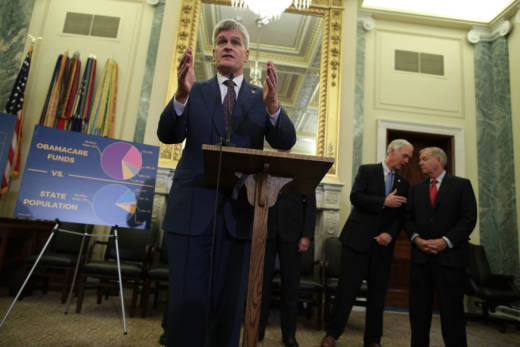“Simply stated, this proposal is the most devastating of the three federal health care proposals that we have evaluated this year,” top officials from the state Department of Health Care Services wrote in an analysis released Friday. “If this amendment is adopted and becomes law, California will be faced with tens of billions of dollars in new costs [and] will require difficult decisions regarding the populations and benefits we choose to cover and how much we pay providers and plans for the services they provide.”
By 2026, California would lose $85.7 billion in federal funds, and by 2027 it would lose $138.8 billion, according to the analysis. That could cause 6.7 million Californians to lose insurance coverage, according to estimates from the The UC Berkeley Labor Center.
A lot of those people are entrepreneurs or their employees. Under the Affordable Care Act in California, half a million self-employed entrepreneurs -- and a million employees who work for small businesses -- got health coverage because of the ACA, either through the expansion of Medi-Cal, or through a subsidized personal insurance plan on the state exchange, Covered California.
"It would be very difficult for entrepreneurs and self employed folks to access some level of coverage," said Mark Herbert, California director for the Small Business Majority. "So it would be massively destabilizing to the ability of small employers to attract talent."
Beyond that, there would be damaging ripple effects, Herbert added: "There's no way that you can remove those sorts of dollars out of our local communities and not see some sort of economic impact on small businesses."
Under the Graham-Cassidy bill’s redistribution formula, several states that shunned the Affordable Care Act would get more money, according to a study by health consulting firm Avalare.
Texas will get a windfall of $35 billion in health funding over the next ten years, more than any other state. State officials would get to decide how they want to spend that money. But advocates and analysts say more money for Texas doesn't necessarily guarantee an improved health care system.
“Regardless of the size of the block grant, there's just no assurance that it would translate into good coverage, or coverage that's as affordable as what we have today,” said Stacey Pogue with the Center for Public Policy Priorities in Austin.
Texas already has the highest number of uninsured folks, and Pogue says the state just doesn't have the infrastructure in place to expand coverage to more people. It didn't expand Medicaid in 2014, which was optional under the ACA, and the state didn't set up its own exchange, like California did with "Covered California." Texans who wanted subsidized insurance plans had to use the federal exchange, healthcare.gov, which meant Texas had less flexibility when it came to regulating insurers.
“There's no planning and no thought put into, 'How would we create affordable coverage for low-income Texans?" Pogue said, "Unlike the 31 states that have expanded Medicaid, have done some central planning. And Texas would be starting from scratch.”
It would also take a lot of political will to make sure the state is actually expanding health care, Pogue added, and that motivation has been lacking among state lawmakers for years. In order to get the block grant, states would need to create a workable health infrastructure by 2020. For comparison, it took Massachusetts four years to set up its pre-Obamacare statewide insurance market.
“We are very concerned,” said Stacy Wilson, president of the Children's Hospital Association of Texas.
Wilson said this pot of money from Cassidy-Graham wouldn't solve chronic problems with Medicaid, 70 percent of which covers children. Wilson explained that's because the federal government would pay a fixed amount per person, under a per capita cap. That formula locks in how much the state gets per Medicaid enrollee, no matter how much treatment those enrollees need.
“We have very low per-capita costs already, and we get locked into that forever,” Wilson said.
A conservative policy group in Texas, The Texas Public Policy Foundation, is also not happy about the bill, but their concern is that it doesn't go far enough to repeal Obamacare.
